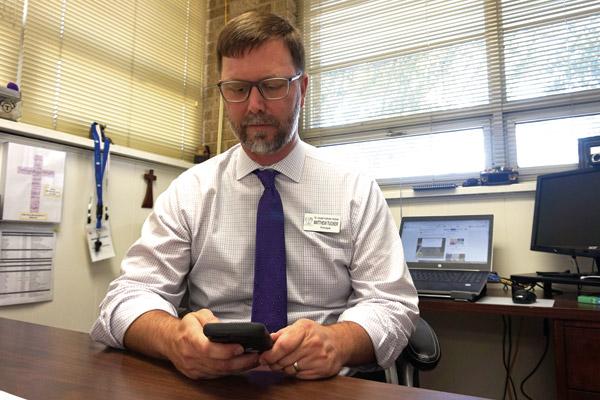

It’s common for parents to post on social media about their child’s first day of school or post a question to GroupMe messaging about the time for the next football practice.
But when a parent posts a criticism, or even an attack, on a teacher or administrator, it stings, said Elizabeth Hudgens, a fifth-grade language arts teacher at Immaculate Conception School in Fort Smith.
“When I see a parent posting something negative about their child’s teacher, their child's school, I can't help but put myself in that position; it hurts,” she said, adding that she has not seen criticism directed at her or other teachers at IC on social media. But in general, “I see it a lot.”
“Unless you’ve taught, I don’t think you can understand what goes into teaching. The daily struggles we face and the amount of pressure we’re under from meeting a wide variety of needs in the classroom, pleasing our administrators, pleasing our parents and still finding time to live a life. To have someone criticize you or just teachers as a profession in general, it depends on the day -- sometimes it breaks my heart and sometimes it makes me really angry.”
The rise of Facebook groups for parents and messaging apps like GroupMe, combined with a generation of millennial parents who grew up communicating via social media, has led to the temptation to rant online about a teacher, principal or school, often without knowing the full story.
Comments like “Everyone in my son’s class failed this test, the teacher is unreasonable” or “The coach is insane for not letting my daughter play” may be intended to simply blow off steam, but it can spiral quickly, with no opportunity for clarification from a teacher or administrator.
“I do believe it's something many of the schools are dealing with. I wouldn't say all. It just depends,” said Marguerite Olberts, associate superintendent for marketing with the diocesan Catholic Schools Office. “But I do think it's certainly something that schools have to be aware of. And keep an eye out for what's going on and how that's impacting their school and their teachers.”
According to a 2020 Pew Research Center survey, one in 10 respondents believed users of social media are “easily confused and believe everything they see or read or are not sure about what to believe.”
When something is posted on social media and everyone jumps on board to agree or share, it may be taken as factual whether it’s true or not, and that can damage an educator's professional reputation.
Years ago, principal Matt Tucker sat in his office at St. Joseph School in Conway, waiting for a parent to arrive. He was prepared to tell the parent that their child would have to withdraw from the school following constant and consistent aggressive comments posted by the parent on social media toward the child’s teacher. The school’s student/parent handbook addresses the consequences of negative or defamatory social media or messaging posts.
“I said basically if this continues, it will not be an option for your child to stay here … because they were so viciously attacking the teacher and they (the teacher) were devastated. It was one of the best teachers in the building I was at,” he said.
An understanding was reached and the child was allowed to stay. While it rarely gets to that level, Tucker said in his 14 years in administration, currently as lead and high school principal at St. Joseph School, he has seen more frequency of negative posting. It usually comes in cycles, at the end of a quarter when grades are posted or following a game.
As an administrator, Tucker said there are negative comments directed toward him, but “I don't read them, I don’t care to.” He knows it comes with the territory, but it’s more heartbreaking when he sees it toward one of his teachers.
“They feel helpless, they feel defeated. They feel bullied in a sense because they know they cannot retaliate in the way they’ve been presented on social media … There’s a professional line,” Tucker said. “... For the teachers of St. Joseph School, they are here because they love teaching. They love teaching in an environment where we get to celebrate and embrace our faith.”
“I completely respect where parents are coming from in their passion for their children, but that teacher is truly invested in that child” as well, he added.
Catholic High School principal Steve Straessle said he’s never seen a personal attack on a teacher, but if he had, “it would necessitate me picking up the phone and inviting that parent to take their son elsewhere.”
Both Tucker and Straessle agree that when parents see negative postings, they are good about sharing screenshots with the school or commenting that it is inappropriate and needs to stop. Oftentimes, teachers or administrators are part of these social media groups.
While 98 percent of the time, the groups will have the “usual banter” and positivity, Straessle said the “2 percent can become a rabbit hole and one without a bottom,” he said.
Most of the time, negative incidents shared on social media are misunderstandings and can be cleared up. But even if a comment is justified, social media is one-sided and gives no opportunity for resolution.
“The reality is, none of us are perfect and we do make mistakes and we, like anybody else, should be held accountable for our mistakes, but social media is rarely the right place for that to occur,” Straessle said.
Catholic High is an all-boys high school in Little Rock, and Straessle said teenage boys “are rarely the most talkative creatures” and that can lead to a misunderstanding with parents about situations that occurred.
“They are given snips here and there about things that happened, and we have parents' imaginations fill in the blanks or the boys' imaginations fill in the blanks,” he said.
As the Rocket Mom coordinator, Ashley Parker, who has sons at Catholic High School and Christ the King School in Little Rock, said she manages the parent Rocket Mom Facebook page and three football GroupMe messaging groups, some of which have more than 150 parents and grandparents.
“Last year, just as a parent, I was noticing just a lot of back and forth. There was some bashing, just things that should not be in an open platform. It was just a mess,” she said. “It’s just not the forum. In the last couple of months I said I think it’s time we set some expectations and teach some etiquette on GroupMe and let parents know it’s not the forum to go out and question what the teacher is doing. Start with your son. You can’t baby them forever. They have to take ownership.”
They have had parents discuss homework, testing and teaching, as well as questioning coaching decisions, like if athletes are staying hydrated enough. But 99 percent of the time, she said it’s a misunderstanding.
“My son has said things and I say, ‘Are you sure about that? You need to talk to the teacher’ and lo and behold the teacher was right,” Parker said. “I think that’s the biggest thing I think parents should take away -- turn it over to your son.”
“I would say they need to step back and look at themselves and realize those people are humans too. Everybody’s got their own story,” Parker added. “... The people who are teaching and coaching our kids are there to make our kids better, not to watch them fail.”
Hudgens said lately, she has seen criticism regarding the Diocese of Little Rock mask mandate for elementary schools this fall, despite the fact that the schools are “trying to keep their child safe.” She has not spoken up in these situations because “I don't want to put myself in a situation that's going to make me feel unprofessional or put a smudge on the face of teachers.”
“I always want to say that type of posting comes from a place of frustration. What parents post might not be their true feelings, heat of the moment,” Hudgens said.
Even before the advent of social media, parents frequently asked other parents about a teacher when their child is starting a new school year and that can often turn into unfair characterizations.
“If they’ve gotten a reputation for being unfair, mean or strict, which is likely not the case, it causes anxiety in our students and to pre-judge a teacher,” Hudgens said, adding that parents may not consider the lasting impacts those comments can cause.
Teachers and administrators recommend before posting on social media or messaging groups to make an in-person appointment with the teacher to clear up any confusion. Hudgens said she’s seen parents often hesitant to reach out to the teacher first.
“We want to solve the problems for these kids as much as the parents do,” she said.
As Catholics, Olberts said it’s important for parents to remember that we are all God’s children, part of one body in the Church and that needs to be respected.
“I think that when we allow ourselves to step off that path, and just rant and criticize and undermine, then I think we've missed, again, our opportunity to witness our Catholic faith,” Olberts said. “And other people see that and they're not going to see that behavior as being Christian. And so, from a Catholic perspective, it's not the way to go.”
Please read our Comments Policy before posting.
Article comments powered by Disqus 2023 Year in Review: Community, teamwork prove pivotal
2023 Year in Review: Community, teamwork prove pivotal
 Catholic school careers lead teachers, staff into faith
Catholic school careers lead teachers, staff into faith
 Off-duty officers patrol Christ the King in Fort Smith
Off-duty officers patrol Christ the King in Fort Smith
 Four schools welcome new leadership this school year
Four schools welcome new leadership this school year
 Ark. Catholic schools grapple with teacher shortage
Ark. Catholic schools grapple with teacher shortage
 Winning directory photo honors Our Lady of Guadalupe
Winning directory photo honors Our Lady of Guadalupe
 St. Paul says: How does the Bible define love?
St. Paul says: How does the Bible define love?
 6 steps to getting married in Diocese of Little Rock
6 steps to getting married in Diocese of Little Rock
 Most frequently asked questions on Catholic marriage
Most frequently asked questions on Catholic marriage
 St. Joseph a model of solidarity with immigrants
St. Joseph a model of solidarity with immigrants
 Two gifts after Jesus’ death: Virgin Mary and Eucharist
Two gifts after Jesus’ death: Virgin Mary and Eucharist
 Why we have an altar, and not just a communion table
Why we have an altar, and not just a communion table
 Pope: Wars should be resolved through nonviolence
Pope: Wars should be resolved through nonviolence
 Living relationship with Jesus Christ in the Eucharist
Living relationship with Jesus Christ in the Eucharist